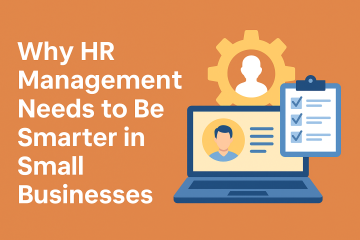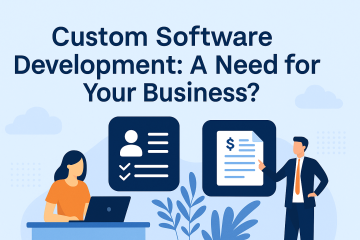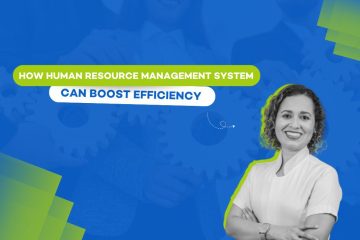Introduction
In today’s competitive business landscape, maximizing productivity is a top priority for companies. Human resources (HR) departments play a crucial role in ensuring that employees remain engaged, productive, and aligned with organizational goals. One of the most effective ways to achieve this is by implementing a Human Resource Management System (HRMS). HRMS solutions streamline administrative tasks, automate complex HR processes, and provide valuable insights into employee performance. For IT companies in Delhi, partnering with a reliable software company in Delhi to implement an HRMS can significantly enhance workforce productivity and overall business efficiency.
This blog will explore how HRMS improves employee productivity and why businesses, especially in IT, should consider adopting this technology.
1. Automating Administrative Tasks
One of the key advantages of an HRMS is its ability to automate repetitive and time-consuming HR tasks. Traditional HR processes, such as payroll management, leave requests, and employee data tracking, often involve manual data entry, which can lead to errors and inefficiencies. By automating these tasks, HRMS solutions free up valuable time for HR professionals, allowing them to focus on more strategic activities.
For example, payroll processing can be fully automated with HRMS, ensuring accurate calculations and timely payments. This reduces the need for manual intervention and minimizes the risk of errors. Additionally, features like automated leave management allow employees to submit requests, receive approvals, and track their leave balances without needing HR involvement. As a result, HR teams can spend more time developing employee engagement programs and driving business growth.
For IT companies in Delhi, where efficiency is critical to success, automating administrative tasks can significantly reduce operational costs and improve overall productivity.
2. Centralized Employee Data Management
Managing employee data is one of the most challenging tasks for HR departments, especially in larger organizations. HRMS provides a centralized platform where all employee-related information is stored, including personal details, performance reviews, benefits, and training history. This centralized system allows HR teams to access information quickly and accurately, improving decision-making and reducing the time spent searching for records.
Having a single source of truth for all employee data also helps prevent data duplication and inconsistencies. For example, when an employee updates their contact details, the change is reflected across the entire system, ensuring that all departments have access to the most up-to-date information. This not only improves internal communication but also ensures compliance with data privacy regulations.
For IT companies in Delhi, managing a large workforce across multiple locations is common. A centralized HRMS ensures that employee data is easily accessible and organized, improving the overall efficiency of HR operations.
3. Streamlined Recruitment and Onboarding
Recruitment and onboarding are critical functions of HR that can directly impact employee productivity. A poor recruitment process can result in hiring the wrong candidates, leading to higher turnover rates and lower productivity. HRMS helps streamline the recruitment process by automating job postings, tracking applicants, and scheduling interviews. This ensures that HR teams can focus on attracting top talent rather than getting bogged down in administrative tasks.
Once a candidate is hired, HRMS also plays a crucial role in the onboarding process. New employees can complete paperwork, access training materials, and get acquainted with company policies through the system. This reduces the time it takes for new hires to become productive members of the team. A smooth onboarding process also improves employee satisfaction, which can lead to higher retention rates.
For fast-growing IT companies in Delhi, where hiring top talent is essential for staying competitive, streamlining recruitment and onboarding through HRMS can lead to faster integration of new employees and improved productivity.
4. Performance Management and Goal Setting
Employee performance is directly tied to overall productivity, and effective performance management is key to driving results. HRMS systems often come with performance management tools that allow HR teams and managers to set performance goals, track progress, and provide feedback. By aligning individual performance goals with company objectives, HRMS ensures that employees are working toward common goals that contribute to the organization’s success.
Performance management features also enable managers to conduct regular performance reviews, track employee achievements, and identify areas for improvement. This ongoing feedback helps employees stay engaged and motivated, leading to higher productivity. Additionally, the system can track training and development needs, ensuring that employees have the skills necessary to meet their goals.
For IT companies in Delhi, where employee performance is critical to delivering high-quality services, having a structured performance management system through Human Resource Management System can significantly boost productivity and engagement.
5. Employee Self-Service Portals
HRMS platforms often come with self-service portals that empower employees to manage their HR-related tasks independently. Employees can access their pay slips, request time off, update personal information, and even enroll in training programs through these portals. This reduces the burden on HR teams and allows employees to handle basic tasks without waiting for approval or intervention.
Self-service portals also enhance employee satisfaction by giving them control over their own data and simplifying HR processes. Employees can quickly access information about their benefits, leave balances, and performance goals, making it easier for them to stay informed and focused on their work.
For IT companies in Delhi, providing employees with easy access to HR services through self-service portals not only improves productivity but also creates a more employee-friendly work environment.
6. Enhanced Compliance and Reporting
Compliance with labor laws and regulations is a critical aspect of HR management. Non-compliance can lead to costly fines, legal issues, and damage to a company’s reputation. HRMS helps ensure compliance by automating compliance-related tasks such as tracking employee work hours, managing overtime, and generating reports required for audits.
Human Resource Management System also come with built-in compliance features that keep businesses up-to-date with the latest regulations. For example, the system can automatically update tax rates and ensure that payroll calculations are accurate. Additionally, HR teams can generate detailed reports on employee performance, attendance, and compensation, which can be used for internal audits and compliance checks.
For IT companies in Delhi, ensuring compliance with local labor laws is essential for maintaining smooth operations. HRMS provides the tools necessary to manage compliance efficiently, reducing the risk of legal complications.
7. Analytics and Data-Driven Decision Making
Data is a valuable resource for making informed business decisions, and HRMS provides HR teams with access to a wealth of employee data. By analyzing metrics such as employee turnover rates, absenteeism, and performance trends, HR teams can identify patterns and develop strategies to improve productivity and employee engagement.
For example, if the data shows a high turnover rate in a specific department, HR can investigate the root cause and take steps to improve retention. Similarly, performance analytics can help identify top performers and ensure they are rewarded appropriately. Data-driven decision-making enables HR teams to make proactive adjustments to their strategies, ultimately leading to better business outcomes.
For IT companies in Delhi, where employee productivity is closely tied to project success, using HRMS analytics to make data-driven decisions can significantly improve workforce management.
Conclusion
Implementing a Human Resource Management System (HRMS) is one of the most effective ways for businesses, especially IT companies in Delhi, to improve employee productivity and streamline HR operations. From automating administrative tasks to providing valuable insights into employee performance, HRMS helps businesses stay competitive in today’s fast-paced environment. By partnering with a reliable software company in Delhi, organizations can ensure that their HRMS is tailored to their specific needs, leading to improved efficiency, reduced costs, and a more engaged workforce.



0 Comments